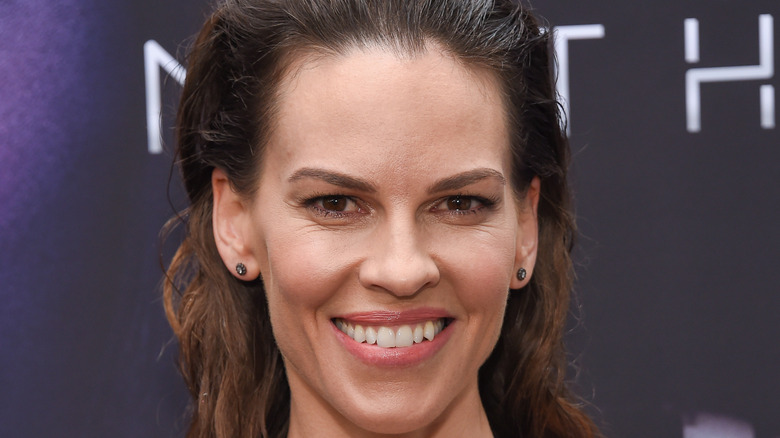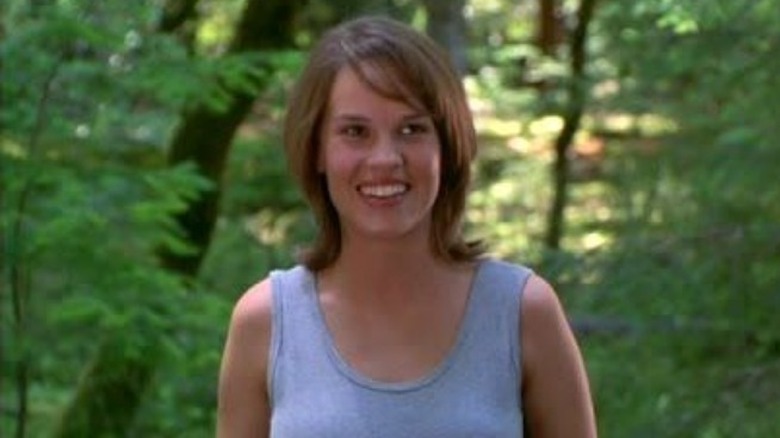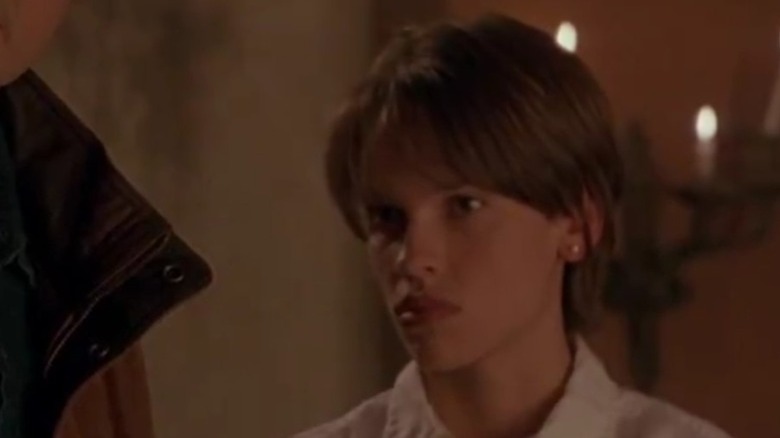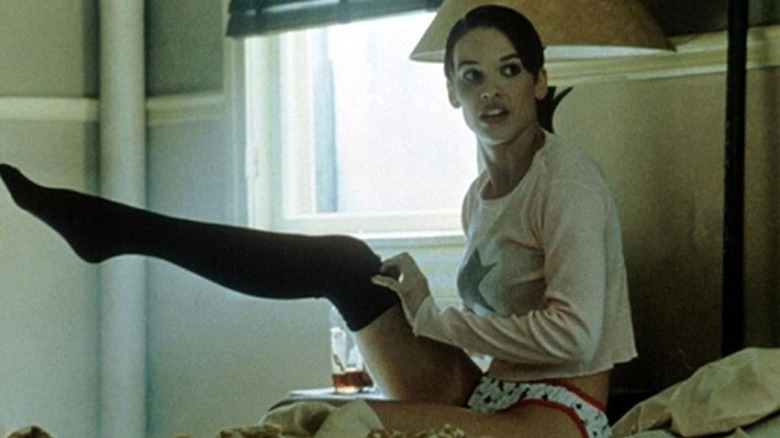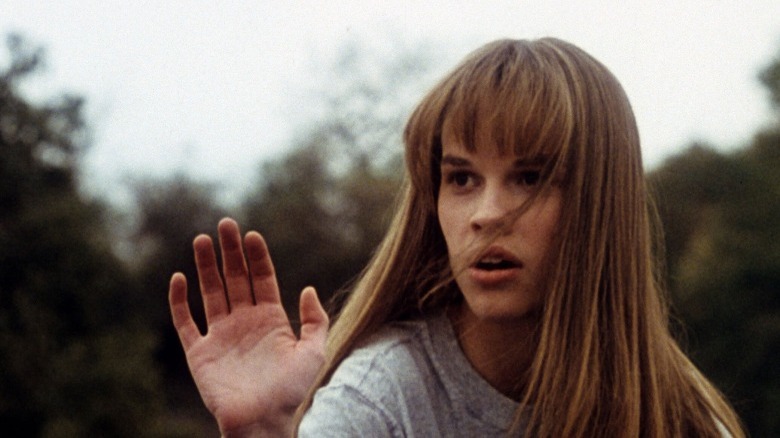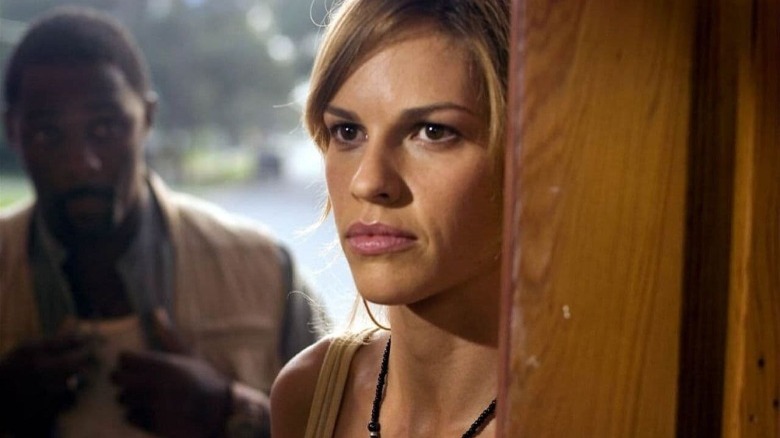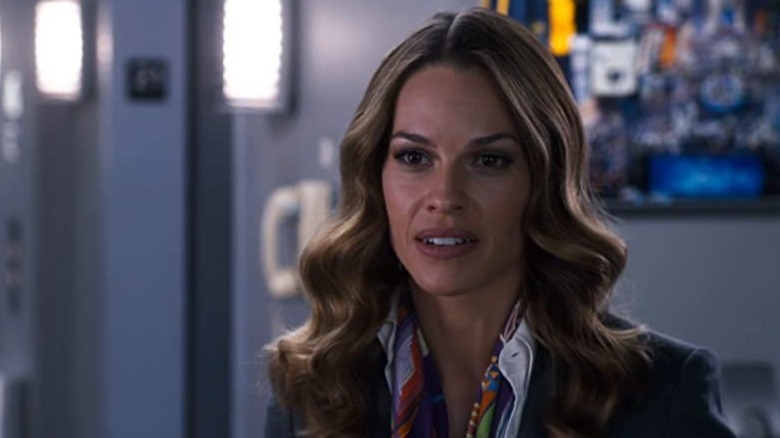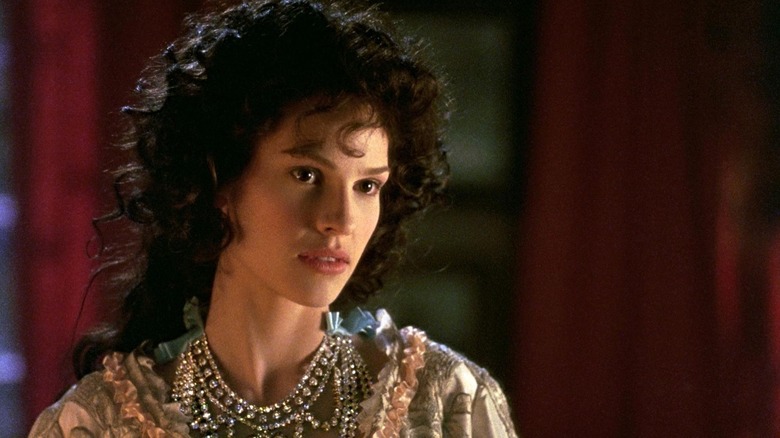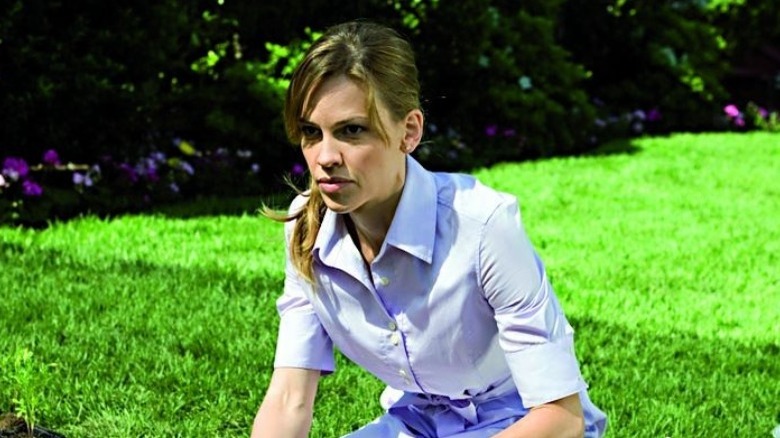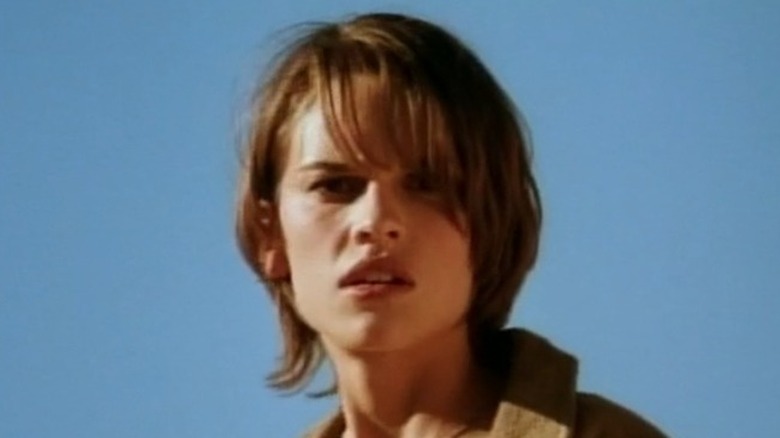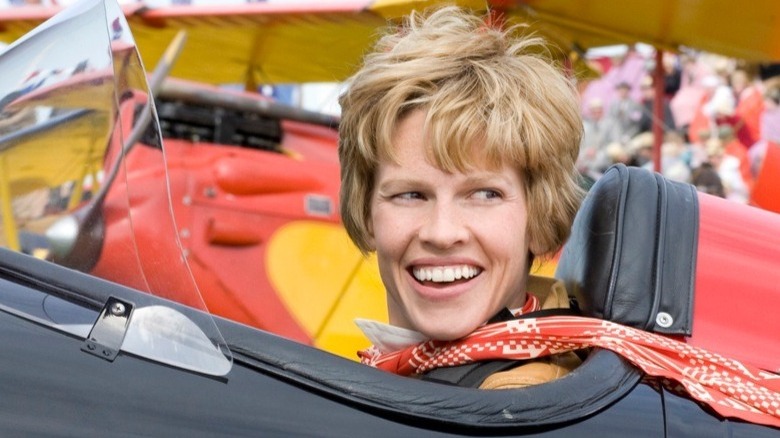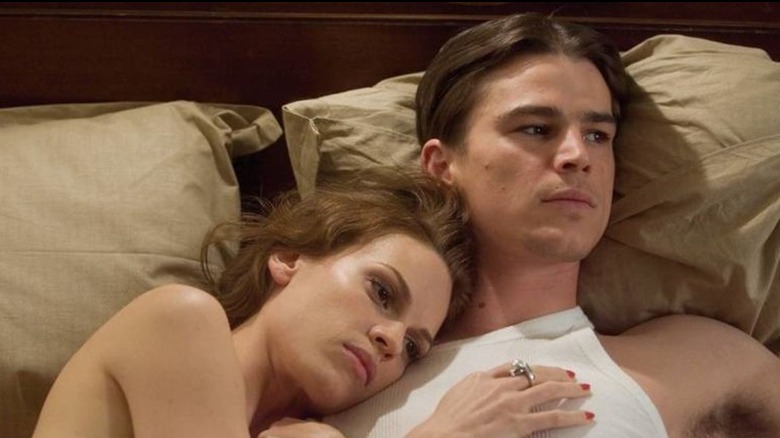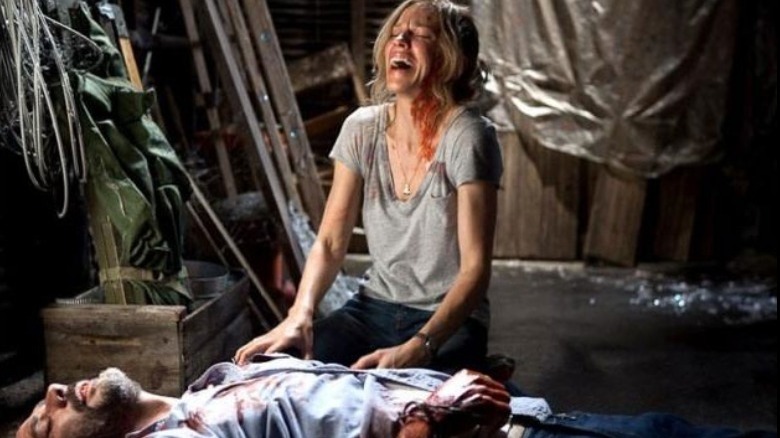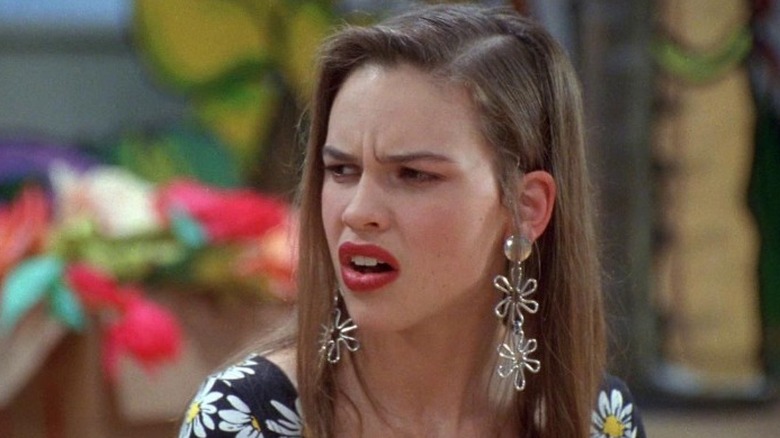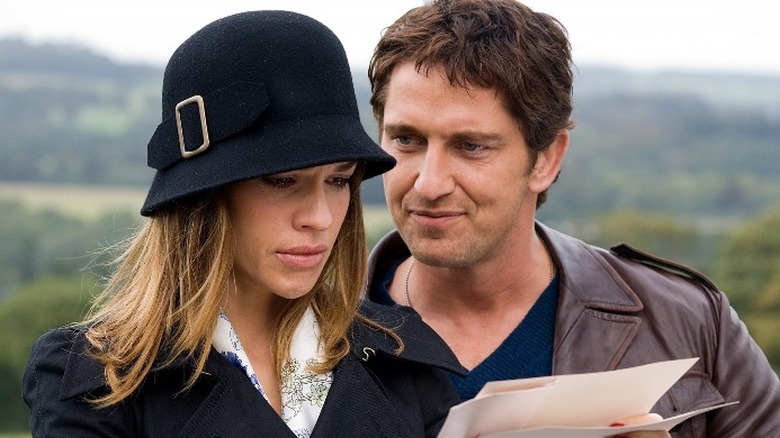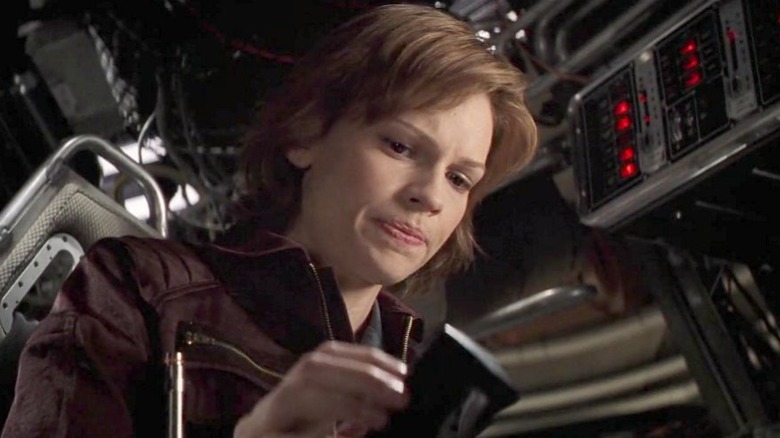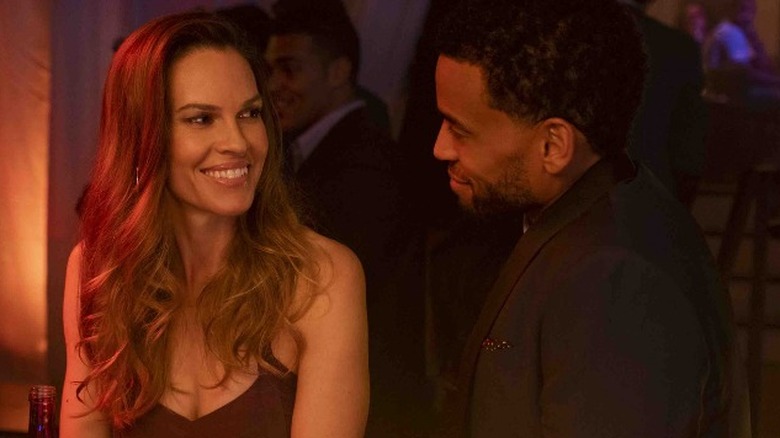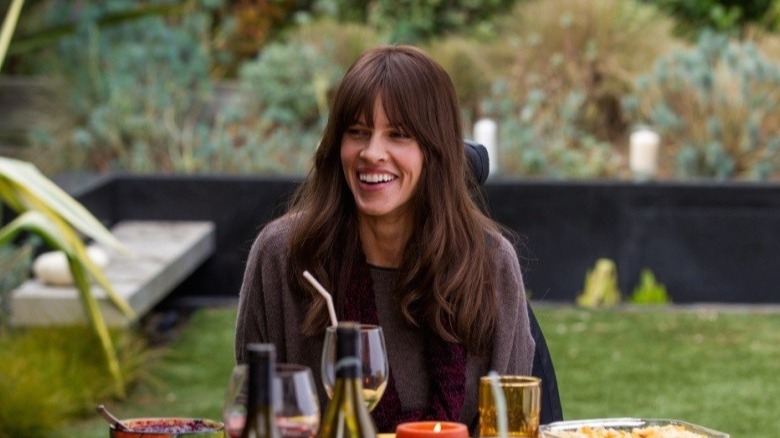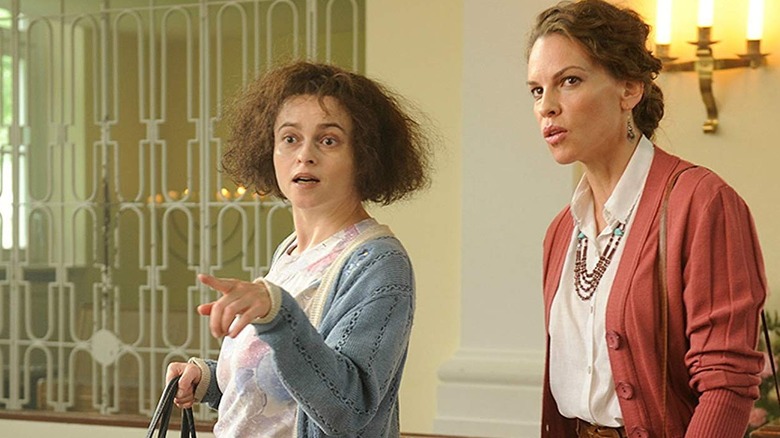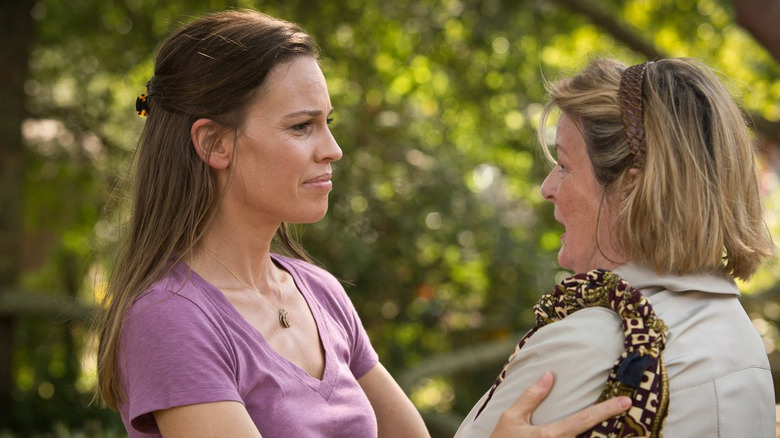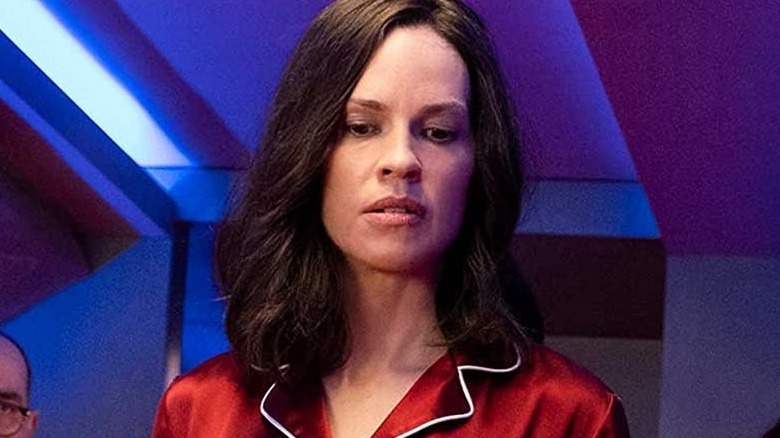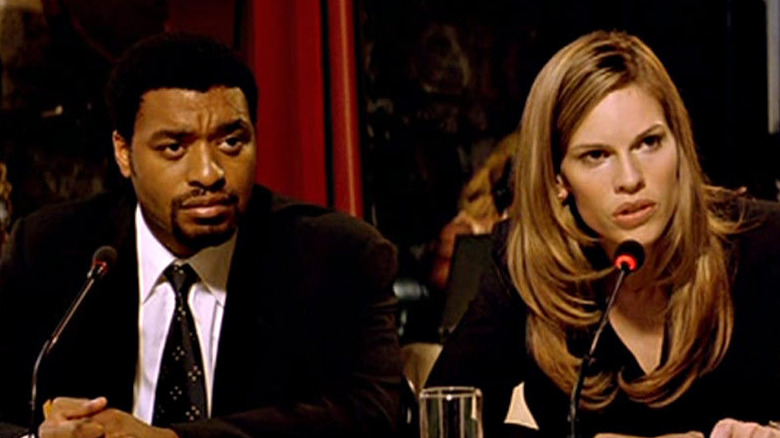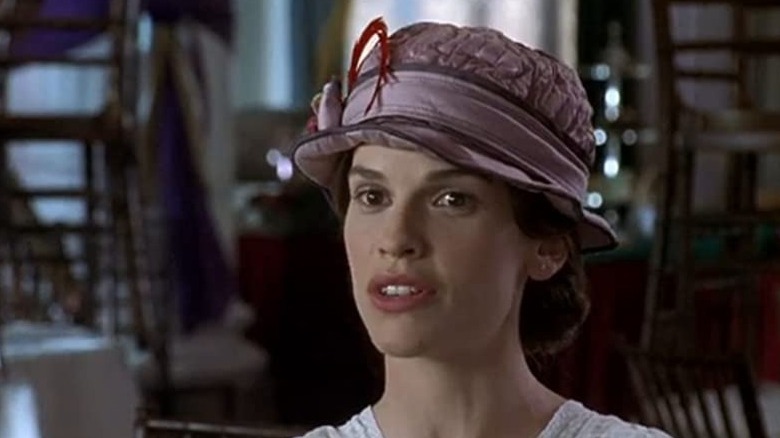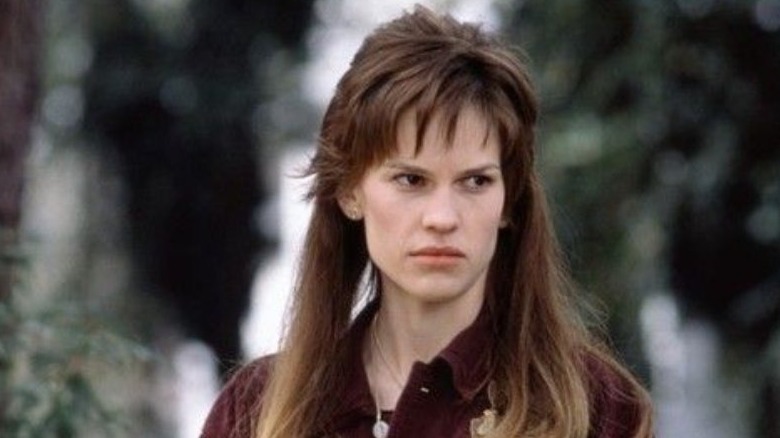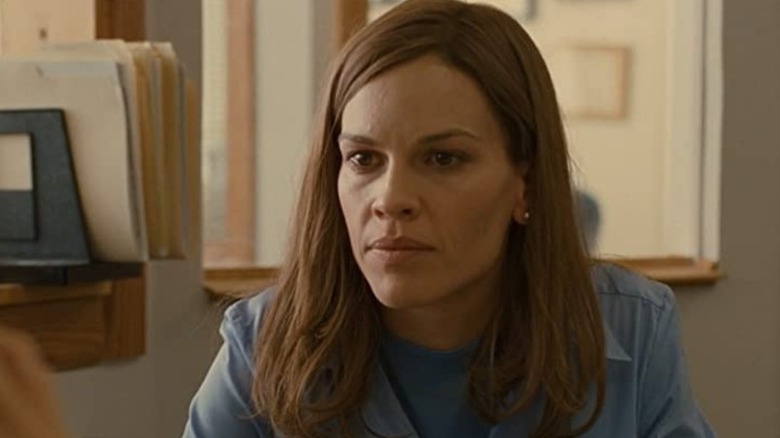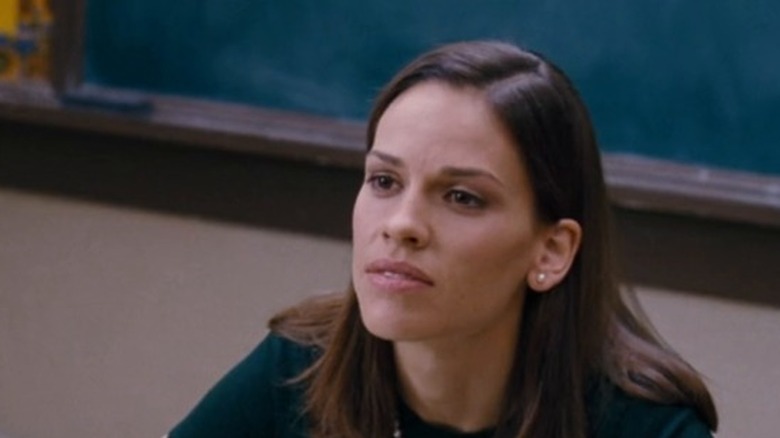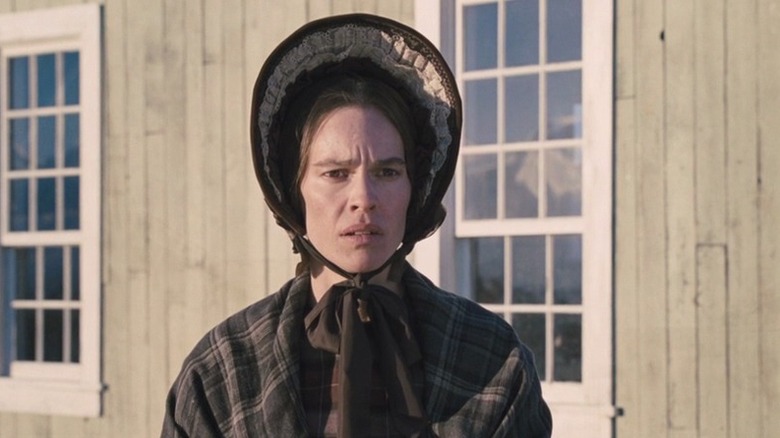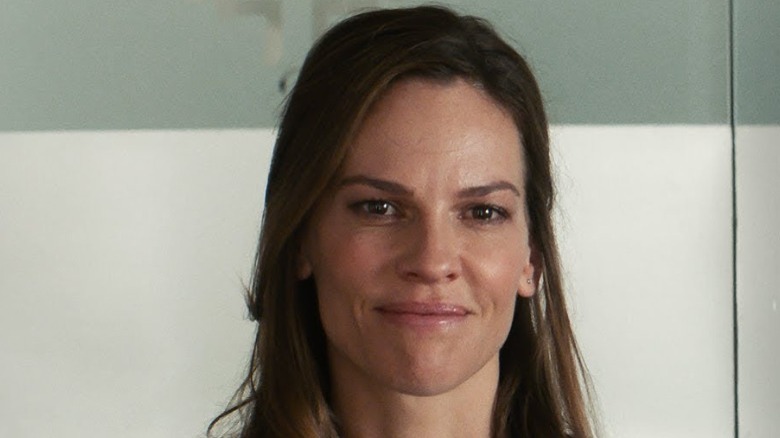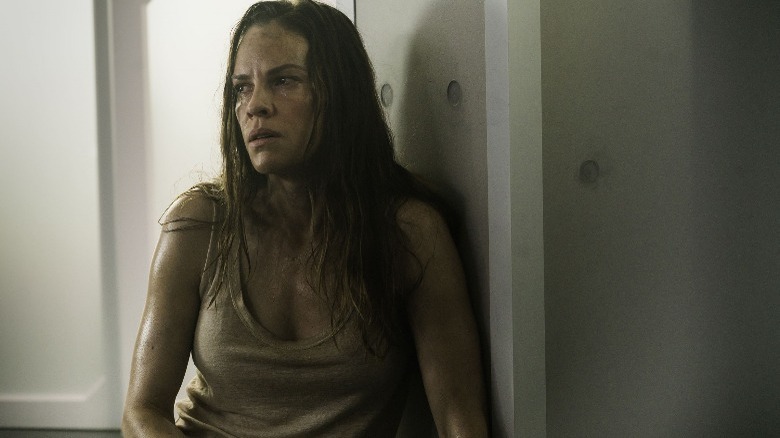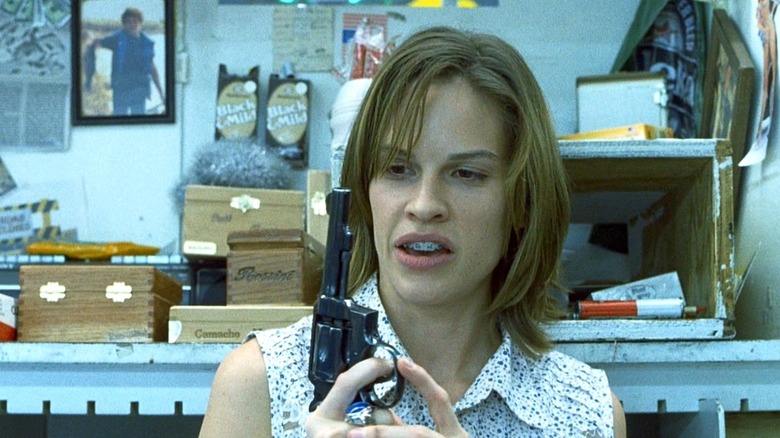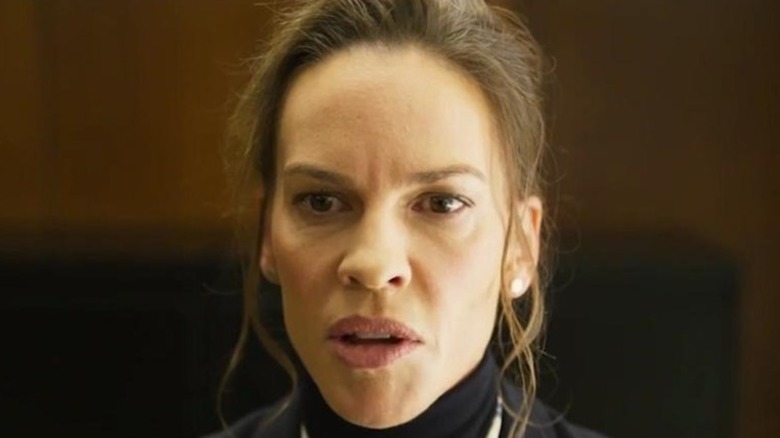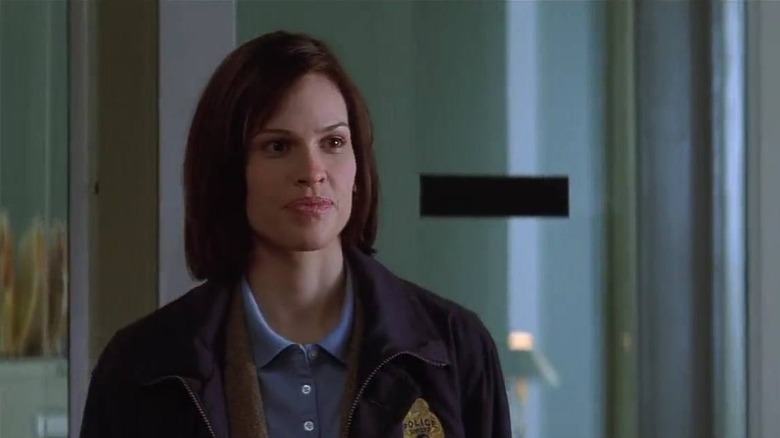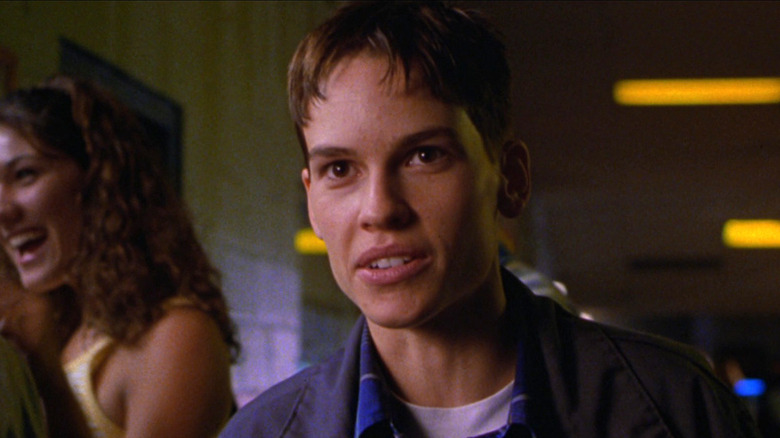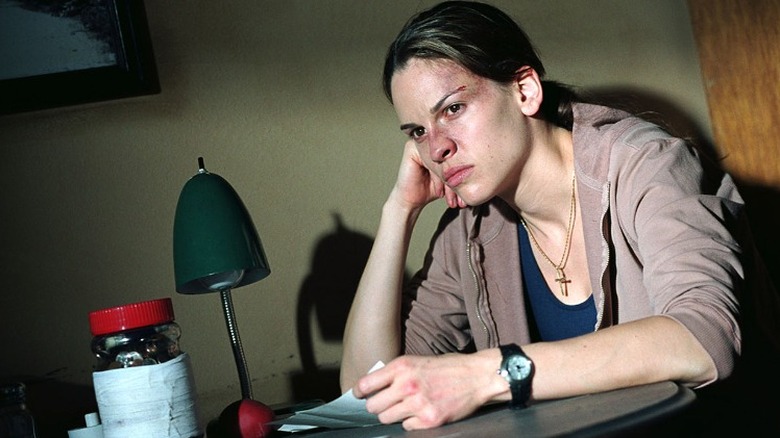Every Hilary Swank Movie Ranked Worst To Best
Hilary Swank sure has come a long way since her days playing single mother Carly Reynolds on "Beverly Hills, 90210." While few could have predicted just how much success the first female "Karate Kid" would come to find as an adult actor, Swank has more than proven herself over the course of her decades-long career. The two-time Academy Award winning actress has more than 50 credits under her belt, and though not all of her choices have been good ones, she has admirably continued to take risks. Swank continues to explore new genres and work with different creatives, and unlike some movie stars, is unafraid to take a supporting role or star in a small independent film.
Swank began her career as a teenager, appearing in a number of small guest spots on television shows like "Harry and the Hendersons" and "Evening Shade." These were followed by a small role in "Buffy the Vampire Slayer," a few terrible TV movies, and a short-lived television series called "Camp Wilder." Her true breakout gig was her Oscar-winning performance in "Boys Don't Cry," after which she continued to find consistent work on the big screen. Though Swank has made some very good films –- a few modern classics, even -– she has also made her fair share of mediocre ones. She has also made some downright terrible movies, including a few high-profile flops that were expected to lead to awards recognition ("Amelia," we are looking at you). Here is every one of Hilary Swank's feature films — and a few HBO movies thrown in as a bonus -– ranked from worst to best.
33. Heartwood
You know a movie is obscure when there is not one notable review to be found across the entire Internet, as is the case with "Heartwood," a very bad movie that Swank made in 1998. It was one of the actress's first films, so we cannot fault her for taking a role in the independent film, but surely she could have found something more worthwhile fresh off her 16-episode arc on "Beverly Hills, 90210." In any case, "Heartwood" is at the bottom of the barrel when it comes to Swank's big-screen outings.
"Heartwood" is about a man named Logan Reeser (Jason Robards), who lives in the small town of Deroy, California, where he runs a sawmill. The community's well-being is threatened when Logan becomes overrun with debt and the target of corporate logging companies. Swank appears as the mill manager's daughter Sylvia Orsini who, together with Logan's mentee Frank Burris (Eddie Mills) –- with whom she is romantically entangled –- must take it upon herself to save the town from ruin. Two years after its release, the film was purchased by Porchlight for television and home video rights (per Variety), no doubt because of Swank's Oscar win for "Boys Don't Cry."
32. Sometimes They Come Back... Again
No one was really asking for a sequel of the 1991 television film "Sometimes They Come Back," but because Hollywood loves a sequel, a terrible follow up was made. "Sometimes They Come Back... Again" came out in 1996 and never even got a theatrical release. The straight-to-video film focused on psychologist Jon Porter (Michael Gross) and his daughter Michelle (Swank) who, along with those around them, are threatened by demons. Jon's sister had been brutally murdered decades earlier, and the thug who killed her (Tony, played by Alexis Arquette) has come back from the dead. Shockingly, there was another awful sequel two years later.
The ideas in "Sometimes They Come Back... Again" are based upon Stephen King's "Characters," but the end product is nowhere near King-level quality. "It's clear that aside from the opportunity to further exploit King's name, there was no real reason for this particular story to 'come back,'" wrote TV Guide. While the film has no critic score on Rotten Tomatoes, it's audience score -– similar to its score on IMDb -– is abysmal.
31. Quiet Days in Hollywood
Swank stands front and center on the poster for "Quiet Days in Hollywood," but that is not exactly something to be proud of. The 1997 film was produced in Germany, where it premiered, and only released on DVD in the United States. Swank appeared in the film opposite her then-husband Chad Lowe, who she married that year (per InStyle). Cute coupling aside, the movie is a clunker and has appalling reviews from audiences. Few critics even bothered to see it.
Despite being a German film, "Quiet Days in Hollywood" is set in Los Angeles. It follows a number of strangers with interwoven stories, each slotted into a reductive role. Swank plays Lolita, a teenage sex worker who is fixated on getting a photo with her movie star idol Peter Blaine (Peter Dobson). Her character gets beat up by a john early in the film, and eventually ends up hooking up with Blaine.
"(Director) Rusnak focuses on the performances of his young cast, not all of whom are able to climb above the unconvincing, often stilted dialogue and coincidence-laden plot," said Variety's Deborah Young. "On the plus side, his stories are just non-American enough to offer a fresh view of an over-filmed town."
30. The Next Karate Kid
"The Next Karate Kid" is a bad movie, but it is an important one in Swank's career, as it marks her first starring role in a film. The 1994 flick is the fourth film in "The Karate Kid" franchise, and the only one to come out in the 1990s (the fifth one did not arrive until 2010). It is also the least successful –- it earned only $15.8 million worldwide, per Box Office Mojo – and the poorest reviewed. Still, it was a high-profile role for an unknown actor like Swank and likely contributed to her finding future work, so perhaps it was worth it. Variety's Lisa Nesselson said "the franchise is still kicking -– but not very high" and called Swank "gratingly cranky at the outset and a tad too enthusiastic once she shapes up."
Swank appears as Julie Pierce in the film, a Boston-area teen being raised by her grandmother, Louisa (Constance Towers) after the death of her parents. Louisa is the widow of Mr. Miyagi's (Pat Morita) commanding officer from World War II, which is how Julie is connected to the legendary karate master. After he sends Louisa away to Los Angeles for peace and quiet, Miyagi ends up taking care of the misbehaving, angry Julie and helps her to channel her anger into her craft. She then uses her skills to defend herself from a tyrannical group of bullies, The Alpha League. The movie lacks the magic of the original with Ralph Macchio, though we can't exactly blame Swank for its many shortcomings.
29. The Reaping
We love a good supernatural horror flick, but "The Reaping" is not one. It is a middling film at best, and features very little in the way of scares, let alone thought-provoking psychological terror. The 2007 film is one of Swank's all-time lowest rated movies when it comes to critics, and though audience scores were higher, we are not quite sure how it managed to gross $62 million at the box office (per Box Office Mojo). Even the poster –- which asks "What hath God wrought?" -– is basic and laughable. "The Reaping has B-movie written all over it ... sadly, there's barely an ironic laugh to be had from this dull affair," wrote the BBC's Anna Smith.
Swank's character is former missionary Katherine Morrissey, who veered away from her Christian faith when her family died. Katherine and a colleague, Ben (Idris Elba), investigators of so-called miracles, are called to Haven, Louisiana, to look into why a river has turned red. There, she and the others experience a number of mysterious biblical plagues that have no scientific explanation. Katherine and Ben investigate the supernatural occurrences and find the presence of a satanic cult who sacrifices second-born children. From there, it just gets more and more ridiculous. "What could Swank really have done with such a cliché-ridden screenplay, except turn it down?," asked Ruthe Stein of the San Francisco Chronicle.
28. New Year's Eve
None of Garry Marshall's holiday-themed ensemble films are any good, and it would be like splitting hairs to debate whether 2011's "New Year's Eve" was quite as bad as its predecessor "Valentine's Day," or successor "Mother's Day." One thing is for sure, however, and that is the fact that the immense talents involved in all of these films deserve far better. A two-time Oscar winner like Swank certainly does not deserve to be relegated to schlocky, unfunny rom-coms like "New Year's Eve." The New York Post called the film "a soul-sucking monument to Hollywood greed and saccharine holiday culture." The film has a dreadful but much-deserved reviewer score on Rotten Tomatoes.
As Vice President of the Times Square Alliance, Swank's Claire Morgan is one of the most important players in the bloated film. The character is in charge of coordinating the ball drop, which she is organizing with police officer Brendan Nolan (Ludacris). Later in the film, we learn that Claire's father Stan Harris is in the hospital and dying of cancer. His final wish is to see the ball drop one more time, which he is able to do when Claire sneaks him onto the roof. He dies minutes later. "If there is some kind of world record for schmaltz, this may have set it," proclaimed The Boston Globe's Jake Coyle. "Included here are first kisses, midnight rendezvous, dying fathers, newborn babies, husbands at war and trapped strangers. It's narcotic mawkishness, with notes played on heartstrings like a 12-string guitar."
27. The Affair of the Necklace
We understand the desire to play against-type, but whoever told Swank that she could pull off playing a down-and-out aristocrat in the 2001 historical drama "The Affair of the Necklace" was clearly not thinking of her strengths. As the San Francisco Chronicle noted, "It's the kind of part that Cate Blanchett or Kate Winslet could play blindfolded, but with Swank in the role — surrounded by British actors who outclass her, saddled with plummy dialogue — it becomes an event, a test, an elaborate stunt." It's a test that Swank failed, and the film was a huge box office bomb, grossing only $1.2 million worldwide (per Box Office Mojo) and earning incredibly poor reviews.
"The Affair of the Necklace" centers on Jeanne de Saint-Rémy de Valois (Swank), an orphan whose family has fallen from grace and who deeply wishes to regain her noble title. Alongside her husband Nicholas de Lamotte (Adrien Brody) and a clued-in gigolo named Rétaux de Villette (Simon Baker), the former aristocrat develops a plan to steal money to finance the buying of property. The scheme involves attempting to steal a 2,800-carat diamond necklace that Jeanne convinces Cardinal Louis de Rohan (Jonathan Pryce) to purchase for Marie Antoinette (Joely Richardson). "The storytelling is hopelessly compromised by the movie's decision to sympathize with Jeanne," wrote famed critic Roger Ebert in his Chicago Sun-Times review, which provided the film two stars out of four.
26. Birds of America
If you have never heard of Swank's 2008 film "Birds of America," you are not alone. The tiny independent dramady premiered at the Sundance Film Festival but made barely a peep in the cultural landscape beyond that. It grossed a paltry $150,000 worldwide, per Box Office Mojo, which is surprising given its star-studded cast. In addition to Swank, the film stars Matthew Perry, Ben Foster, Ginnifer Goodwin, and Lauren Graham. Even then, it is not a good film and so maybe it belongs in the land of the forgotten. "Quirkiness, as it is here, is often just an excuse for eccentric behavior with no real explanation," said The Hollywood Reporter's James Greenberg after viewing the film at Sundance.
The movie is about Morrie Tanager (Perry) and his family, which includes wife Betty (Graham) and siblings Jay (Foster) and Ida (Goodwin). Morrie and Betty are trying to start a family, but their plans are tested when Morrie's siblings show up in need of shelter. Swank plays Laura, the Tanager's neighbor and the wife of Morrie's professorial colleague Paul (Gary Wilmes). Though she does not portray a member of the dysfunctional Tanager clan, Swank's supporting turn was praised by Variety in their review. In fact, the "solid" performances are just about the only thing Variety seemed to like. "The characters and the dynamics between them are moderately engaging, but never compelling or hilarious," wrote reviewer Dennis Harvey.
25. Kounterfeit
Given that it was a straight-to-video release, one would think that "Kounterfeit" would be at the very bottom of Swank's list of films. But while the movie is not necessarily good, it is also not terrible –- at least not in comparison to some of her others. It was, after all, co-written by David Chase, who is responsible for gifting us with the magic of "The Sopranos." "Kounterfeit" is a 1996 action thriller begins with a counterfeiter's murder, after which an ex-criminal named Frankie (Bruce Payne) and an associate that goes by the moniker "Hopscotch" (Andrew Hawkes) team up to launder the money.
The film has a wide range of characters, including undercover police officer Danny (Mark-Paul Gosselaar) and his sister Colleen (Swank), who bears witness to Danny's murder during a shootout. Other characters include Hopscotch's shady brother Marty (Corbin Bernsen) and corrupt cop Vic (Rob Stewart), who are attracted to the fake money and make a violent play for it. Colleen comes out on top, with a few kills under her belt and a whole lot of money, but the movie is full of crime film cliches and is rather forgettable in the big scheme of things. However, as TV Guide noted in its review, "Despite (or perhaps because of) unsubtle injections of broad comedy, this low-budget thriller throws viewers a few more curves than most direct-to-video obscurities."
24. Amelia
Hopes were high when it was announced that Swank would star as legendary pilot Amelia Earhart in a biopic from notable director Mira Nair, but "Amelia" did not live up to its promise. Not only was it a big box office disappointment, grossing just under $20 million worldwide (per Box Office Mojo), but it was also critically panned. The 2009 film is one of the most disappointing entries on Swank's list of movies because, unlike some of her other weaker films, this one had all of the ingredients to work. Swank's acting was not particularly well received, nor was Mair's direction or the paint-by-numbers script. For example, NPR wrote that "Swank inhabits her wardrobe more persuasively than she does an on-again, off-again Midwestern accent — or indeed the character herself."
Swank both headlined and executive produced "Amelia," which begins with the 1937 flight around the world on which the famed feminist icon disappeared, and then backtracks to cover her life proceeding the flight. Richard Gere plays Earhart's husband George Putnam, and Ewan McGregor portrays a pilot with whom she has an affair named Gene Vidal. But even with the romantic elements, the film is overall a snooze. The New York Post labelled the film a "1-st class seat to dullsville," while USA Today said "it's too bad that a film about a daring and audacious woman taking on staggering challenges plays it so safe."
23. The Black Dahlia
Swank's next movie after the Oscar-winning "Million Dollar Baby" was "The Black Dahlia," a deeply disappointing follow up to one of her signature roles. "The Black Dahlia" was an unexpected choice for Swank, a neo-noir crime flick from Brian de Palma with high visual allure and not a lot else. Though it did nab a cinematography nod at that year's Academy Awards, the 2006 film received mostly negative reviews from critics. Many talked of the actors being miscast, such as the San Francisco Chronicle's Mike LaSalle, who said that "Josh Hartnett, Scarlett Johansson and Hilary Swank — talented people who've done good work in the past — ultimately come off like lightweights, like kids playing dress up."
Swank played against-type here as Madeleine Linscott, a wealthy socialite with a wealth of secrets about Elizabeth Short (Mia Kirshner), a murdered actress that the press has dubbed "The Black Dahlia." The film focuses on Elizabeth's murder investigation, which is being headed by LAPD detectives Lee Blanchard (Aaron Eckhart) and Dwight 'Bucky' Bleichert (Hartnett). Both men face personal issues as they untangle the web of deceit -– all of it leading back to Madeleine and her dysfunctional family. The film is based upon a 1987 novel, and the real-life murder is absolutely fascinating, so perhaps somebody will one day craft a film that covers it in a way that feels more realistic and provides for more entertainment.
22. The Resident
For someone with so much talent, Swank has a terrible sense for movies that will actually allow those talents to shine. The 2011 thriller "The Resident" does not utilize her to her full talents, though the mediocre British film does have its decent moments. It also reunites Swank with her "P.S. I Love You" co-star Jeffrey Dean Morgan, with whom she has palpable chemistry. It is your run-of-the-mill obsession movie -– one of many that came out around that time, including"Obsession," "The Roommate," and "The Boy Next Door" -– and many of the review noted its generic, somewhat asinine script. Entertainment Weekly's Chris Nashawaty took a brutal (but accurate) jab at the film when he wrote, "If you've ever watched Jennie Garth cowering before some creep on Lifetime, you know exactly what's on tap in this bad boy."
In "The Resident," Swank plays emergency room doctor Juliet Devereau, who has recently parted ways with her cheating partner Jack (Lee Pace) and has rented an apartment from charming Max (Morgan). Juliet quickly starts dating Max, not realizing that he has been watching her through secret passages and one-way mirrors. When Juliet starts things up again with Jack, Max gets violent toward her lover. As enjoyable as the end is, it is not enough to make up for the rest of the film's basic writing.
21. Buffy the Vampire Slayer
Swank is not a big part of "Buffy the Vampire Slayer," but she was in enough of the film for it to register as a notable step in her at-the-time very young career. In fact, "Buffy the Vampire Slayer" was Swank's first feature film, and it is a fun time re-watching it to spot the 18-year-old Swank. "Buffy the Vampire Slayer" was by no means a massive success –- it grossed only $16.6 million, per Box Office Mojo –- and we cannot entirely argue with Variety, which said the film "this is bargain-basement stuff for a major studio feature." At the same time, the movie has achieved cult status since its 1992 release and it led to the immensely fruitful television adaptation starring Sarah Michelle Gellar, so we would be hard-pressed to rank it too low.
The film version of "Buffy the Vampire Slayer" focused on Los Angeles high school student Buffy Summers (Kristy Swanson), who is informed by a mysterious man, Merrick (Donald Sutherland), that she is The Slayer –- a person chosen to kill vampires. Buffy takes on local vampires while still trying to be a normal high school senior. Swank plays Kimberly Hannah, one of Buffy's friends molded after the typical "Valley Girl" stereotype. "I was completely nervous because I didn't want to mess up," Swank told Yahoo! In 2014. "All the sudden got this opportunity to live my dream. I was living the high life!"
20. P.S. I Love You
"P.S. I Love You" was panned by most critics, but audiences seem to have really liked it, based upon its scores on Rotten Tomatoes and IMDb. While we would not go so far as to say that the movie was good, we have to side with the audience here. "P.S. I Love You" is an enjoyable movie to watch on a rainy Sunday afternoon when you don't want to have to think, and we totally get why it grossed over $150 million at the box office (per Box Office Mojo). The 2007 flick is technically a romantic comedy, but it is also a drama that will have you crying ugly tears.
Swank appears in the film as Holly Reilly-Kennedy, a woman desperately in love with her husband Gerry (Gerard Butler), but who at times takes their New York City life for granted. Gerry dies of a brain tumor early in the film, but before he does, he arranges for a number of messages to reach Holly after his death — starting with one accompanied by a 30th birthday cake. The film follows Holly's journey of grief and self-discovery, which includes a trip to Gerry's native Ireland alongside friends Denise Hennessey (Lisa Kudrow) and Sharon McCarthy (Gina Gershon), a flirty friendship with a man named Daniel (Harry Connick Jr.), and a fling with Gerry's Irish best friend William Gallagher (Jeffrey Dean Morgan). It is schmaltzy for sure, but a little sugar is fine on occasion.
19. The Core
"The Core" is a 2003 science fiction film, one of Swank's only forays into the popular genre. The film is an unremarkable one, and it received mixed-to-poor reviews from critics. It was also a box office failure, bringing in $74 million in grosses but costing a reported $85 million to make (per The Numbers). While Swank has done far worse films, no one is going to mistake "The Core" for one of her better ones (they probably don't even remember it). Still, a few critics praised her performance. The Seattle Times' Moira Macdonald, for example, said it was "sweetly earnest."
"The Core" centers on a team who must drill into the Earth in order to set off nuclear explosions that will relaunch its rotation. Swank plays Major Rebecca Childs, an astronaut who has been commissioned to co-pilot the USS Virgil alongside her mentor, Commander Robert Iverson (Bruce Greenwood). The rest of the cast is made up of pro thespians -– from Aaron Eckhart to Stanley Tucci to Alfre Woodard -– but none of them could elevate the basic disaster movie material. "So much of this film is pure hooey, and so great is its need to impress, that you often get the feeling you're watching some Saturday morning rerun on Sci-Fi Matinee," wrote the Austin Chronicle's Marc Savlov.
18. Fatale
The 2020 thriller "Fatale" is not a good movie, but not unwatchable either. It is actually Swank's performance that makes the film work, and it is incredibly fun to see her play an unstable villain in the "Fatal Attraction"-inspired film. As The Hollywood Reporter's Frank Scheck wrote, "'Fatale' proves very watchable, in an incredulous B-movie kind of way." Swank appears as Val Quinlan, a detective with an unstable personality and questionable grasp on reality. After a one-night stand with the married Derrick Tyler (Michael Ealy), Val becomes embroiled in his life when she is assigned to investigate a break in at his home. Soon enough, she has murdered Derrick's cheating wife Tracie (Damaris Lewis) and best friend Rafe (Mike Colter), while at the same time trying to blackmail him into killing her politician ex-husband, whom she is stalking.
There is a lot going on in "Fatale," and nearly all of it formulaic. But as an over-the-top campy thriller, it has elements that are enjoyable. "In the time-honoured manner of cheap thrillers, the aim is to stir things up rather than to say anything very coherent," wrote The Age's Jake Wilson. "But as the screws tighten and the body count rises, there are some provocative moments." The film received mixed reviews from critics and raked in just over $7 million at the box office –- not spectacular, but not a complete failure given that it came out during the height of the COVID-19 pandemic.
17. You're Not You
"You're Not You" is a Swank vehicle through and through –- not just starring the actress, but also co-produced by her. Though its Rotten Tomatoes audience score and IMDb score are quite decent, the 2014 drama received mixed review from critics. Even the mediocre reviews often praised the central performances. "You're Not You isn't entirely successful in avoiding a television movie-style predictability in its depiction of its central character's incapacitating illness," noted The Hollywood Reporter, before affirming that "its superb performances and emotional complexity ultimately elevate its familiar themes."
Swank plays Kate Parker, a classic pianist who has been diagnosed with ALS (aka Lou Gehrig's Disease) and is struggling to come to terms with how ill she's becoming. Emmy Rossum appears as her free-spirited caregiver Bec Cartwell, with whom she forms an unexpected friendship, and Josh Duhamel as suffering husband Evan — who reacts to the stress of a sick wife by having an affair. We have seen this type of film done many times before, but Swank shines in and it is a shame that so few people have seen this film. Variety praised her subtle, multilayered take on the role -– including the way she manipulated her voice and physicality as the character's disease worsened. "Hilary Swank gives a sensitive, nuanced illustration of the disease's horrible physical toll," wrote critic Andrew Barker.
16. 55 Steps
The Hollywood Reporter declared that Swank's film "55 Steps" is "too many strides from good," which is exactly why it ranks in the middle of our list. The German/Belgian film made its premier at the Toronto International Film Festival (TIFF) in 2017 and was released in Germany the following year (per The Numbers). It never ran theatrically in the United States.
Swank shares the screen with Helena Bonham Carter in "55 Steps," and the actors are very much co-leads. Bonham Carter plays Eleanor Riese, a plaintiff in a 1987 California case about rights for patients suffering from mental crises, while Swank plays her lawyer Colette Hughes. In a typical movie cliché, Eleanor (who suffers from mental illness) manages to enlighten and loosen uptight Colette, showing her that there is more to life than work. It is not a particularly good courtroom movie, nor is it a nuanced portrayal of mental illness. Variety's Dennis Harvey wrote that the film was "a competent but uninspired case-pleading meller (that) fails to elicit memorable work from any of its principal collaborators."
15. Mary and Martha
As far as television films go, "Mary and Martha" is a decently insightful and entertaining one. It's not one of HBO's best (it originally aired on the BBC and then later on HBO), but certainly better than most of what you would find on basic cable. The 2013 drama is based upon a true story in which two women who have lost their children to malaria join together to help malaria prevention efforts. Variety called it an "emotionally stirring triumph" and "a passionate piece of advocacy" in its review.
The two mothers at the heart of "Mary and Martha" are American Mary (Swank) and Brit Martha (Brenda Blethyn). While on an extended trip in Africa, Mary's son George (Lux Haney-Jardine) dies after being bitten by a mosquito infected with malaria. After his funeral, she heads back to Mozambique. There, she meets Martha, whose son Ben (Sam Claflin) had been working at an orphanage when he too succumbed to the disease. Both women are overwrought with grief -– especially know-it-all yuppie Mary, who dragged her son to Africa because he was being bullied -– and so they decide to act. The climax of the film has them bringing the cause to Washington, with the help of Mary's politician father Tom (James Woods), from whom she has been estranged. The film received mixed reviews, with the Austin Chronicle calling the final chunk of action "captivating," but the New York Post saying, "the movie plays more like a based-on-fact Lifetime flick than an HBO work of fiction."
14. The Hunt
Swank's "The Hunt" had a lot of potential for box office success, until a few major setbacks derailed its ascension. First, Universal Pictures decided to delay the controversial horror film -– about a group of people being hunted -– after a number of high-profile shootings and backlash for its perceived anti-Republican bias (per IndieWire). Then, when "The Hunt" did come out in March 2020, it was at the very start of the COVID-19 closures across America. "'The Hunt' was going to be a big hit movie, and the controversy before the movie destroyed the release of the movie," producer Jason Blum said in an interview with Comicbook.com. Controversy aside, the film received mixed-to-positive critical reviews, so it is unclear whether the satirical thriller would actually have had legs.
In the film, a dozen strangers mysteriously find themselves in a clearing, with no explanation as to how they arrived there. These people –- referred to as "the deplorables" –- are right-leaning Internet conspiracy theorists who are being hunted for sport by a group of liberals, led by Athena Stone (Swank). The hunted (which includes the likes of Betty Gilpin, Justin Hartley, and Emma Roberts) battle back as the elites aim to pick them off one by one. As The Hollywood Reporter's legendary Todd McCarthy wrote, "The filmmakers go out of their way to surprise, to not allow their story to become predictable or conventional, to maintain a spirit of audacity."
13. Red Dust
"Red Dust" was the first feature film directed by Tom Hooper, who would go on to direct fantastic movies like "The King's Speech," "Les Miserables," and "The Danish Girl." While "Red Dust" is nowhere near as bad as Hooper's "Cats," it is far from the quality of his other flicks. Based upon a novel of the same name, the movie is set in South Africa and explores the complicated history of apartheid in the country. Variety called the film "respectful, well-crafted, but unmemorable," which is how what has it ranked mid-list.
Swank appears in "Red Dust" as Sarah Barcant, a New York City lawyer who grew up in South Africa and who was once arrested for having a Black boyfriend. When her lawyer Ben Hoffman (Marius Weyers) is unable to take on a local case, he asks Sarah to fill in for him as a favor. Sarah's client is Alex Mpondo (Chiwetel Ejiofor), a Black politician who was tortured under apartheid and who is being tasked with speaking in front of the Truth & Reconciliation Commission. What could have been an important, affecting film is, simply put, a rather boring affair. "While pacing is smart and claustrophobia avoided, this remains essentially a courtroom drama, with a tendency to get verbose, explaining everything as though for the public record," noted Variety's Dennis Harvey. "That approach leaves little room for the performers to create organic, non-position-paper lives for the characters."
12. Iron Jawed Angels
While she starred in a number of television films early in her career, Swank has been in only a couple of TV movies since her 1999 Oscar win for "Boys Don't Cry." One of these is "Iron Jawed Angels," which premiered at the Sundance Film Festival and later aired on HBO, both in 2004. And while it is nowhere near the level of the similarly themed "Suffragette," a 2015 film starring Carey Mulligan, "Iron Jawed Angels" is a sufficiently entertaining look at the American women's' fight for the right to vote. Reception was mixed –- Variety called it "talky" and "melodramatic," while the Boston Globe said the story resonated, despite its limitations.
Swank appears in the film as Alice Paul, an American woman who has been inspired by the Women's Social and Political Union's efforts in the United Kingdom. She aims to change the suffragist movement stateside upon her return to America. Alongside Lucy Burns (Frances O'Connor), she fights for a constitutional amendment and eventually takes over D.C.-based operations for the National American Woman's Suffrage Association (NAWSA). Even though the film was not universally beloved, it received five Primetime Emmy Award nominations. For her work in the film, Swank was nominated for both a Golden Globe Award and a Screen Actors Guild Award.
11. The Gift
Most big movie stars have a "type" that they play really well, and for Swank, that type has been working class characters from small-town America. This describes the characters she played in both of her Oscar winning roles, and it describes her character in the supernatural thriller "The Gift," a 2000 film from director Sam Raimi. While we cannot argue with The Washington Post's Curt Fields, who said the movie is "so chock-full of stereotypes as to be a filmic Southern Country Safari," we also recognize its cinematic contributions. It is suspenseful, relatively engaging, and decently well-acted –- a good but not great movie that Roger Ebert described as being set "in a swamp of melodrama."
The movie centers on Annie Wilson (Cate Blanchett), a psychic widow who lives in Brixton, Georgia. After Annie has a vision that a missing woman (played by Katie Holmes) has been murdered and thrown into a pond, the cops find the woman in a pond outside the home of Donnie Barksdale (Keanu Reeves). Swank plays Donnie's wife abused Valerie, who is one of Annie's clients. Giovanni Ribisi, J.K. Simmons, and Greg Kinnear are also central players in the film. Most of the reviews focus on Blanchett's acting, while Swank received lesser acclaim for her role. CNN said the part "doesn't give her much room to move," while the San Francisco Chronicle's review said "she's pure camp but doesn't know it."
10. Conviction
Audiences may not have flocked to theatres to see "Conviction," Swank's 2010 legal drama, but the actress was very good in the largely overlooked film, which was directed by "Scandal" actor Tony Goldwyn. Swank even earned a Screen Actors Guild Nomination for her role as central character Betty Anne Waters, and though the movie had its critics, more reviews were favorable than adverse. Yes, it is predictable and borderline cheesy, but the performances make it work. "Swank continues to show startling skill in fully inhabiting a character," wrote USA Today's Claudia Puig, while also praising Sam Rockwell for his supporting turn, and Roger Ebert wrote in his Chicago Sun-Times Review that "you can hardly imagine anyone else playing Betty Anne Waters."
The film, which is based upon real-life events, features Betty Anne's fight to free her brother Kenny (Rockwell) from prison for a crime of which she believes he is innocent. A bartender and mother, Betty Anne eventually goes back to school to appeal her brother's murder charges, ruining her marriage and neglecting her children in her pursuit of justice. With the help of her school friend Abra (Minnie Driver), she takes on missing evidence, DNA samples, and coerced trial witnesses to ultimately broker Kenny's freedom. It is another instance of Swank playing a strong-willed, blue-collar character, but that does not mean it should be skipped.
9. Freedom Writers
This is the point on our list where we have reached the top tier of Swank's resume –- films that were praised by the overwhelming majority of critics and most of which utilize Swank's talents to their full capacity. In "Freedom Writers," Swank plays an idealistic teacher who inspires her at-risk students. Though the movie is based upon a 1999 book ("The Freedom Writers Diary"), the white teacher saving students of color trope is one we have seen many times before. Even then, the movie achieves what it set out to do, in that it is inspirational, engaging, and heartfelt. "Although 'Freedom Writers' is the latest in a long line of saint-saves-students stories, it takes the bold approach of being earnest, honest and unafraid to be called naïve," noted Variety's John Anderson. "As a result, it's extremely affecting."
Swank plays real-life teacher Erin Gruwell in the film, which is set in Long Beach, California, in the mid-1990s. Erin is assigned to teach English at Woodrow Wilson High School, where racial tension is high and student engagement is low. Like in all movies of this kind, she slowly wins the students over and teaches them not only English, but meaningful life skills. She also has them craft diaries, which she assembles and publishes while encouraging the kids to apply to college. The movie's sincerity hinges on Swank's performance, and most critics agreed that she did well with the role. "Swank's performance helps the medicine go down, too, making this a pleasant watch despite its indulgent length and sketchy characters," wrote the BBC's Anna Smith.
8. The Homesman
In 2014's "The Homesman," Swank took on one of the only genres she had yet to attempt, the Western, with fantastic results. The film –- which was co-written and directed by her co-star Tommy Lee Jones –- is based upon a 1988 novel of the same name, set in the Midwest circa the 1850s. Unlike most historical Westerns, "The Homesman" is largely female-driven, with Swank taking center stage as a Mary Bee Cuddy, a former teacher who now works in a farming community in the Nebraska Territory. Her performance earned her nominations from a handful of critic groups, including the San Diego Film Critics Society and the Boston Society of Film Critics.
As an unmarried woman, Mary Bee is somewhat of an outcast, thought to be too bossy and too plain for marriage, but she is also accomplished and independent. She is tasked with transporting three young women who are believed to be mentally unstable -– grieving mother Arabella Sours (Grace Gummer), abused wife Gro Svendsen (Sonja Richter), and Theoline Belknap (Miranda Otto), who killed her child because her family was starving –- to a hospice run by minister's wife Altha Carter (Meryl Streep). She finds a claim jumper named George Briggs (Jones) along the way and persuades him to help her make the journey. "This beautifully crafted film intrigues as a story never told before and ratchets up dramatic interest through a succession of unexpected turns," wrote The Hollywood Reporter's renowned critic Todd McCarthy.
7. What They Had
Some of Swank's best movies are also her least well-known, as is the case with the 2018 under-the-radar drama "What They Had." The film premiered at Sundance and opened months later in only four theatres -– at its widest, it played in only 53 theatres, so it makes sense why its worldwide total gross is just over half a million dollars (per Box Office Mojo). But any movie buff knows that what makes the bucks at the box office is not necessarily good, and vice versa, and so "What They Had" should not be written off as forgettable by any means. The film is a poignant and engrossing family drama that will stick with you long after it ends, particularly if you have ever dealt with the illness or loss of a loved one.
"What They Had" centers on a family dealing with matriarch Ruth Everhardt's (Blythe Danner) progressing Alzheimer's disease. Swank plays daughter Bridget "Bitty" Ertz, who ventures back to her family's home after her mother has an incident on Christmas Eve. While there, she attempts to help her brother Nicky (Michael Shannon) convince their father Norbert (Robert Forster) to put their mother in a care facility. All the while, Bitty is dealing with her own anxiety problems and a lack of connection with her husband and daughter. NPR's Ella Taylor called the film "finely textured," and though it received some mixed reviews, the vast majority of critics praised the drama.
6. I Am Mother
The main characters may not have actual names in "I Am Mother" -– Swank is simply credited as "Woman," for example –- but a moniker is not required for characters to leap off the screen. The 2019 dystopic science fiction thriller is truly inventive and enthralling, and it is one of Swank's strongest reviewed films. Critical consensus was not entirely positive, and the film is not perfect, but it has cool technology and a neat story that make it worth a watch. "While 'I Am Mother' does show its cards a touch too early, it never ceases to be intriguing and tense," wrote the New York Post, while TV Guide said, "It's like a head-smashing bottle episode from the future."
"I Am Mother" centers on a human girl, Daughter (Clara Rugaard), who is being raised in a post-apocalyptic world in a bunker by a robot, Mother (voiced by Rose Byrne, performed by Luke Hawker), who created her after an extinction event. One day, Daughter hears a woman outside the bunker in need of help, so she opens the lock and lets Woman (Swank) come inside wearing a hazmat suit. Mother flips out, and we later learn that Mother is actually the AI that created the robots that are rebooting humanity (and that they are at war with the human survivors.) Daughter must figure out who to trust –- the machine that created her, or the human with the bullet wound in her leg and a fantastic story about the outside world.
5. 11:14
Few people have ever heard of the black comedy thriller "11:14," but the indie movie is one of Swank's best reviewed films to date. It is an ensemble film that follows five separate but interwoven storylines that all culminate one night at 11:14 p.m. A series of flashbacks reveal how the 10 main characters and their different storylines connect to one another, and how they relate to the 11:14 p.m. car crash that serves as the film's defining arc. "There's so much forward momentum that the structural gimmick never feels like a gimmick — the information simply flows, with auds gleaning a few more puzzle pieces on each pass," wrote Variety's Lisa Nesselson.
The whole film revolves around only a 40-minute stretch of time, but each of the five parts are integral pieces of the mystery. Though we see Swank's character Buzzy in earlier sections, her role is central in "part four," where we learn that Buzzy works the night shift at a convenience store. She allows her co-worker Duffy Nichols (Shawn Hatosy) to stage a robbery, forcing him to shoot her in the arm to make it realistic. She is later arrested as an accomplice when she refuses to give up her friend, which explains why Buzzy was in a cop car in the film's first sequence. As The San Francisco Chronicle's Mike LaSalle notes, "Why would famous actors take small parts in an independent film with no guarantee of its ever being released? It had to be the script." Swank was not given much to do, but the movie itself is a gem.
4. Logan Lucky
"Logan Lucky" is a super cool movie, and it could have perhaps broken into our top three if Swank had a larger role. Even though it is an ensemble film, Swank's presence is integral to its success and her performance is commendable. As a whole, Steven Soderbergh's 2017 heist movie is comical, fun, and stylish. As Todd McCarthy noted in his review for The Hollywood Reporter, "Soderbergh has made the sort of breezy, unpretentious, just-for-fun film that scarcely exists anymore, one almost anyone could enjoy." It was a nice change of pace for Swank, who tends to mostly excel in dark, brooding dramas.
The film is centered on the Logan family, a down-on-their-luck West Virginia clan who decide to turn to crime to make their way out of poverty. The family of crooks includes recently fired blue collar worker Jimmy (Channing Tatum), his ex-vet brother Clyde (Adam Driver), their hairdresser sister Mellie (Riley Keough), and Jimmy's ex-wife and baby mama Bobbie Jo Chapman (Katie Holmes). Career criminal Joe Bang (Daniel Craig) and his idiotic brothers also play a key role in the plan to steal a bunch of money from the Charlotte Motor Speedway, where NASCAR is housed. Swank plays FBI Agent Sarah Grayson, so she gets to let loose less than some of the others, but the movie itself is a hoot (see it for Daniel Craig alone). "Steven Soderbergh's goofy 'Logan Lucky' pulls a delightfully country-fried heist," said USA Today's Brian Truitt.
3. Insomnia
The Christopher Nolan directed "Insomnia" is an adored film, particularly by critics, who responded to the strong acting, acute directing, and psychologically twisted story. The film, which was released in 2002, grossed $113.7 million at the box office (per Box Office Mojo) and marked the first time that Swank appeared as a law enforcement agent in a movie (but certainly not the last). She remarkably holds her own acting against two screen legends, Al Pacino and Robin Williams, in a film that hinges on its central performances. As The Seattle Times' Moira Macdonald wrote in her review, "Despite a nifty action sequence involving floating logs and the obligatory final-act violence, 'Insomnia' is really an actor's showcase."
The thriller is set in a small town in Alaska, where two LAPD detectives are sent to help unseasoned local detective Ellie Burr (Swank) after the mysterious murder of a teenage girl. The more seasoned cop, Will Dormer (Pacino), is under investigation for sketchy methods used in past cases, and the other one, Hap Eckhart (Martin Donovan) is set to testify against him. When Dormer snakes out the killer, a deep fog causes him to accidentally kill Eckhart at the scene of the crime. He covers it up and hides the truth from Burr -– who eventually figures it out -– and proceeds to suffer from an intense days-long bout of insomnia. Williams plays the villain, crime writer Walter Finch, who murdered the 17-year-old, and who blackmails Dormer after seeing him kill Eckhart.
2. Boys Don't Cry
As a film, "Boys Don't Cry" lands in our second-to-best spot, but in terms of performance, this one may be Swank's crowning glory. The film that put the actress on the map –- and won her an Oscar -– is a devastatingly raw and achingly powerful one, based upon a gut-wrenching true story. It centers on the life and death of Brandon Teena (Swank), a transgender man who became the victim of a heinous hate crime at the hands of two acquaintances in small-town Nebraska. His death is proceeding by a tender love affair with Lana Tisdel (Chloë Sevigny), to whom Brandon does not initially disclose his trans identity.
"Boys Don't Cry" is an extremely difficult movie to watch, but it is also an important one that cannot be missed. As famed critic Peter Travers wrote in his Rolling Stone review, "Swank and Sevigny give performances that burn in the memory. 'Boys Don't Cry' means to shake you, and does."
1. Million Dollar Baby
If you have seen "Million Dollar Baby," you probably expected it to be down at the bottom of this list. It did, after all, win four Academy Awards, including the coveted Best Picture prize and Best Actress for Swank. Couple that with an extremely high critic score on Rotten Tomatoes and $216 million in worldwide grosses (per Box Office Mojo), and it is hard to justify not ranking "Million Dollar Baby" as the best of Swank's film offerings. "Hilary Swank is astonishing as Maggie. Every note is true," wrote renowned film critic Roger Ebert in his four-star (out of four) Chicago Sun-Times review.
Swank plays Maggie Fitzgerald, a Missouri waitress who longs to outgrow her life in the Ozarks and hopes that boxing will be her way out. She shows up at the Los Angeles gym of cranky trainer Frankie Dunn (Clint Eastwood) and begs him to train her. He eventually agrees to do so at the coaxing of his employee Eddie "Scrap-iron" Dupree (Morgan Freeman), a former boxer who Frankie trained. From there, we follow Maggie through the amateurs all the way to a $1 million title fight against a German world champion.
